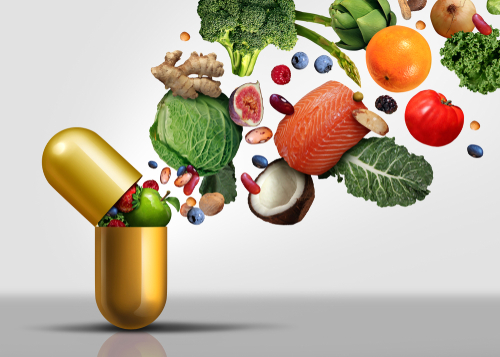Vitamins and Nutrients That Help with Drug Detox
Why Vitamins and Nutrients Are Helpful During Drug Detox
Oftentimes, drug addiction can make one lose their appetite or crave unhealthy foods. This can result in malnutrition and deficiency of important vitamins and minerals. The goal of a detox is to enable the body to heal after a drug addiction and rid oneself of the toxins and chemicals ingested during addiction. Vitamins and proper nutrients play an important role in this process.
If the recovering person has the proper nutrients they need, detox will be smoother and less painful. Below are some of the vitamins that are helpful for various types of drug detoxes. These lists are not exhaustive, and recovering patients should always seek the guidance of a medical professional, like the addiction specialists at Freedom Detox in Charlotte, North Carolina.
Vitamins for Alcohol Detox
Alcohol inhibits the absorption of thiamin (vitamin B1), vitamin B-12, folic acid, and zinc. When the liver breaks down alcohol, it cannot release extra glucose to the bloodstream, which causes sugar levels to drop as well. Alcohol also prevents the production of the important amino acid Glutamine, so individuals dealing with alcoholism are typically not creating enough of it.
This is how each of these vitamins helps with alcohol detox:
- Thiamin: A deficiency of thiamin, or vitamin B1, can result in heart failure, brain damage, loss of weight and appetite, confusion, memory loss, and muscle weakness, as backed by the National Institutes of Health. This is because Thiamin is responsible for converting food into energy, so it is vital for the nerves, muscles, brain, and heart. Alcohol inhibits the full absorption of thiamin in the gastrointestinal tract, so individuals struggling with alcohol abuse are often deficient in this vitamin. During detox, proper intake of thiamin will help the body heal and return to a healthy state. Foods that are high in thiamin include whole grains, meats like beef, steak, and pork, trout and bluefin tuna, egg, legumes and peas, nuts, and seeds.
- Vitamin B-12: Your body needs vitamin B12 to make red blood cells, nerves, DNA, and other functions. B-12 is one of the most common deficiencies seen in recovering alcoholics. The reasons for this are similar to the reasons for thiamin deficiency. The gastrointestinal tract loses its ability to absorb B-12 when abusing alcohol. Symptoms of vitamin B-12 deficiency include weakness, fatigue, confusion, memory loss, low appetite, dizziness, and numbness. Several studies have demonstrated the positive impact that B-12 can have during detox. This could be due to the fact that vitamin B-12 is powerful in biochemical repair, and normal function of the digestive system is required for vitamin B-12 absorption.
- Folic acid: Studies from Harvard School of Public Health show that folic acid may help fight alcohol-related damage and can help prevent the risk of chronic diseases that are associated with alcohol abuse. Harvard School of Public Health studied 83,000 women between the ages of 34 and 59 and found that amongst them, the heavy drinkers who consumed minimal folate had the highest risk of heart disease and cancer. For these reasons, in addition to the fact that the vitamin helps the body produce new cells, folic acid supplements and folate-rich foods are helpful during alcohol detox. Foods that contain folic acid include broccoli, brussels sprouts, leafy green vegetables, peas, and chickpeas.
- Zinc: Zinc plays an important role in regulating immune function, fighting off bacteria and viruses, DNA synthesis, and wound healing. Healthy people tend to naturally consume the recommended amount of zinc per day, but the majority of patients with alcohol addiction do not. This discrepancy might be due to secondary mechanisms like reduced liver function, which affects Zinc absorption and metabolism. In this way, zinc supplements and zinc-rich foods can help reduce alcohol-induced toxicity and assist in detoxification. Foods that are rich in zinc include red meat, shellfish, legumes, seeds, nuts, whole grains, eggs, and dark chocolate.
- For blood sugar levels: Alcohol withdrawal may result in low blood sugar. Patients who have low blood sugar will experience symptoms like shaking, sweating, fatigue, chills, and irritability. The best way to raise blood sugar levels is to consume foods with healthy sugars. Fruits like bananas, apples, and oranges are great options.
If you are experiencing alcohol withdrawal and going through detox, it is important to consult with a medical professional before consuming any supplements. Call Freedom Detox at (800) 475-2312 or contact us online for detox guidance.
Vitamins for Opioid Detox
Opioid use interferes with the body’s metabolism of nutrients. Over time, opioid use damages the intestinal lining, which impairs the ability to absorb nutrients. Common deficiencies that are seen in recovering opioid addicts are calcium, magnesium, B-vitamins, omega-3, antioxidants, and amino acids.
This is how each of these vitamins helps with opioid detox:
- Calcium: Opioids have been reported to inhibit calcium channels in striatal spiny neurons. These neurons play a key role in coordinating various brain functions such as motivation and motor planning. Calcium is one of the most important minerals in the body. It helps build healthy teeth and bones, enables muscles to contract, and is essential for heart function. These benefits are especially helpful during opioid detox, a time when the body might feel weak before it feels better. Foods that are famous for being high in calcium include cheese, yogurt, milk, sardines, leafy greens, orange juice, and soybeans.
- Magnesium: Magnesium is helpful for patients going through opioid detox because it can slow the development of tolerance to opiates. Tolerance reduces the effects of a drug and stimulates a user’s urge for more. Magnesium also helps maintain normal nerve and muscle function, supports a healthy immune system, helps keep a steady heartbeat, and like calcium, it helps build strong bones. It also helps to produce energy and protein. These reasons make it beneficial to consume during detox. Magnesium-rich foods include pumpkin seeds, almonds, spinach, cashews, peanuts, black beans, edamame, and avocado.
- B-vitamins: Opioid addiction affects the body’s supply of B-vitamins in a similar way to alcohol addiction. Because vitamins B-6 and B-12 help with the synthesis of serotonin, the chemical that regulates mood, they are essential nutrients to have during detox. B-vitamins are known as the building blocks of a healthy body, as they directly impact energy levels, brain function, and cell metabolism. The best sources of B-vitamins are whole grains, meat, eggs and dairy products, seeds and nuts, dark, leafy vegetables, and fruits.
- Omega-3: Omega-3s and fatty acids are great for reducing pain because they decrease inflammation. Inflammation in the brain and gut has been correlated to a negative emotional state during opioid withdrawal. The intended usage of opioids is to reduce pain, so omega-3s can help ease the body into a life free of opioid abuse.
- Antioxidants: It has been shown that opioids damage the activity of antioxidant systems. Antioxidants are necessary to protect your cells against free radicals, which may play a role in heart disease, cancer, and other diseases. Antioxidant use can improve the disturbance in the body that opioids cause and help the person in recovery reach homeostasis, or a stable internal state that perseveres despite changes in the world outside. Foods that are high in antioxidants include dark chocolate, pecans, blueberries, strawberries, artichokes, goji berries, raspberries, and kale.
- Amino acids: Individuals who struggle with addiction also tend to suffer from low GABA activity in the brain. GABA is an amino acid that can be found in the brain and is believed to slow down the firing of neurons, which helps people feel relaxed and calm. Research has shown that it can help people with anxiety disorders. Foods that are great for boosting GABA include leafy green vegetables, soybeans, adzuki beans, mushrooms, spinach, tomatoes, buckwheat, peas, chestnuts, sweet potatoes, sprouted grains, brown rice, and white tea.
Vitamins and Nutrients for Stimulant Detox
The word “stimulant” is used to refer to the group of drugs that increases activity in the body. Illicit stimulants include cocaine, crack, and methamphetamine. Stimulant abuse can result in insomnia, weight loss, nutritional deficits, psychosis, cardiac arrhythmia, liver damage, dental damage, and paranoia. In addition to the psychological support that our team at Freedom Detox can provide, we offer medication services for detox, in which we monitor your progress and can recommend the nutrients that will be the most helpful in your recovery.
These are some of the vitamins and nutrients that are helpful during stimulant detox:
- Protein: When in recovery from stimulant abuse, protein will help rebuild lost muscle mass and repair the damage that came from overstimulating the organs. Our medical specialists can also recommend nutritional supplements to help with nutrient depletion during detox. Some of the best sources of protein are eggs, almonds, chicken breast, oats, cottage cheese, Greek yogurt, milk, broccoli, lean beef, tuna, quinoa, and peanuts.
- Omega-3: This supplement proves to be helpful when detoxing from most substances, including stimulants. Omega-3s help the production of hormones, which in turn help the heart, support cell membranes, and reduce inflammation. Omega-3s also improve mental health and brain function, which can help alleviate some of the damages that might have been made during addiction.
- Iron: When recovering from stimulant addiction, some patients can feel fatigued and grow restless while they are still craving the drug. When iron levels are low, these feelings can grow even worse. If iron supply is low, the patient can suffer from anemia, which can make recovery more difficult because of the fatigue, loss of energy, shortness of breath, and headache that accompany it.
- Multivitamin: Stimulants can have a negative impact on various systems within the body, so in addition to maintaining a healthy eating routine, a multivitamin can also help assist with recovery. During a stimulant addiction, the body is forced to work extra hard, which damages the cells in a variety of ways. The best way to achieve optimal recovery is to be as healthy as possible on the way there, and long after. Iron-rich foods include beans, lentils, tofu, baked potatoes, cashews, leafy vegetables, and whole grains.
- B-vitamins: B-vitamins can help with stimulant detox in similar ways to how they help with alcohol and opiate detox. Specifically, vitamin B and B16 can help elevate mood and improve mental health. Detoxing from stimulants can cause depression in some patients and these vitamins can uplift the mood and combat those negative feelings.
It is always best to seek the help of a medical professional or trained addiction specialist when going through detox. For guidance on the best ways to help your body recover from an addiction, seek daily individualized care from Freedom Detox by calling us today at (800) 475-2312 or contacting us online.










